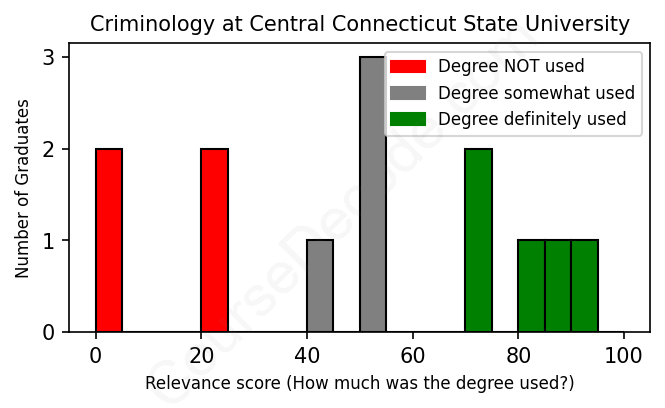
First, some facts. Of the Criminology graduates from Central Connecticut State University we've analyzed , here's how many have used (or NOT used) their degree in their career:

These are estimates based on AI analysis of 13 LinkedIn profiles (see below).
The verdict? Significantly below average. Overall, with an average relevance score of 49%, Criminology graduates from Central Connecticut State University have a much lower likelihood (-18%) of finding work in this field compared to the average graduate across all fields:
And for comparison, here's the chart for all profiles we've looked at across all degrees.
Also, after graduating, 46% of these graduates have pursued further education other than another Bachelor's degree (such as a Masters degree or other), compared to the average across all profiles of 35%. This suggests you may need more than just a Bachelors degree to be competitive as a Criminology graduate.
See the details:
|
Relevance score: 89% We think this person has gone into a career highly relevant to their degree. We think this person has gone into a career highly relevant to their degree.
DEGREE INFOGraduated in 2013 from Central Connecticut State University with a Bachelor of Arts - BA in Criminology. No other secondary education since. JOB HISTORY SINCE GRADUATIONResident Advisor Career Systems Development Corp Aug 2013 - Dec 2015 Direct Care Worker  The Childrens Center of Hamden Jan 2016 - Present ABOUTExperienced Direct Care Worker with a demonstrated history of working in the non-profit organization industry. Skilled in Report Writing, Group Facilitation, Childcare, and Human Services. Community and social services professional with a Bachelor of Arts - BA focused in Criminology from Central Connecticut State University. |
The top 10 most common jobs done by the graduates we've analyzed (ranked most common to least) are:
When looking at the job trajectories of graduates from Central Connecticut State University who earned a degree in Criminology, there seems to be a significant mix, with a lot of people ending up in positions that don’t directly relate to their field of study. While some have found paths that align well with criminology, like becoming police officers, correctional officers, and working in victim advocacy, many others have ventured into completely different sectors such as customer service, nursing, and even real estate. It's noteworthy that while these jobs might hone some transferable skills—like problem-solving and communication—most lack a strong connection to specific criminological knowledge or practice.
Overall, it's clear that while a few graduates capitalized on their criminology degree in relevant roles, a good number of them have ended up in positions that don't utilize their education directly. This doesn’t mean they aren't employing soft skills learned during their studies, but it does suggest that the job market may not always align neatly with expectations for criminology graduates. So, for anyone considering this path, it's essential to think about how to leverage that degree effectively, whether through networking or seeking out internships that directly connect to criminal justice or related fields.
Here is a visual representation of the most common words in job titles for Criminology graduates (this is across all Criminology graduates we've analyzed, not just those who went to Central Connecticut State University):

Graduates from Central Connecticut State University who major in Criminology seem to have a fairly mixed bag when it comes to their career trajectories. For many, the first job out of college often doesn’t align perfectly with the criminology field. For example, some graduates ended up in roles like office service associates or in nursing, which, while rewarding, are not directly linked to criminology. However, a significant number do manage to find their footing in relevant positions within a few years, like police officers or correctional officers. You can definitely see that some individuals are building solid careers in law enforcement or related fields after gaining initial experience, though it’s not uniform across all graduates.
Looking five to ten years down the line, it appears that those who started in law enforcement or social services often stay in those fields and advance into roles with more responsibility, such as program coordinators or specialized counselors. On the other hand, several graduates might drift away from their criminology roots altogether, landing in various jobs spanning from customer service to management in other areas. So, while there are success stories in achieving relevant careers within criminology, there’s also a noteworthy number of grads who find themselves in jobs that could be seen as unrelated or less impactful in terms of their original degree focus. All in all, it’s clear that while some grads leverage their criminology background well, others seem to take a more roundabout path in their careers.
Getting a Bachelor’s degree in Criminology at Central Connecticut State University is generally seen as a manageable experience for most students. It’s not considered overly difficult compared to some other majors, but it does have its challenges, like any degree. You’ll dive into various subjects like criminal behavior, social justice, and the justice system, which can be really engaging if you’re interested in the topic. The coursework balances theory and research, so if you're willing to put in the effort and stay organized, you should be able to handle it just fine. Plus, professors are usually pretty supportive and can help you understand the material better, which makes the journey easier. Overall, it’s a solid choice if you’re passionate about criminology!
Most commonly, in the LinkedIn profiles we've looked at, it takes people 4 years to finish a Bachelor degree in Criminology.
Alright, let’s break it down! It looks like the graduates from Central Connecticut State University have gone down a pretty mixed path in terms of income. Some, like the flight attendant turned pilot at Delta Air Lines and the progression at Unilever, have definitely landed gigs that likely pay decent salaries, particularly as they move up in their careers. Others, like those working in education or as correctional officers, might not be raking in the big bucks, especially early on. Then there are roles like the recovery support supervisor and various counseling positions that can vary widely in pay based on experience and location. Overall, while some folks are definitely doing better than others, it seems like many of them might be working jobs that are more about passion than financial windfall, at least for now.
Here is a visual representation of the most common words seen in the "about" section of LinkedIn profiles who have a Bachelor degree in Criminology (this is across all Criminology graduates we've analyzed, not just those who went to Central Connecticut State University). This may or may not be useful:

Here are all colleges offering a Bachelor degree in Criminology (ordered by the average relevance score of their Criminology graduates, best to worst) where we have analyzed at least 10 of their graduates:
| College | Score | Count |
|---|---|---|
 California State University, Fresno California State University, Fresno
|
67 | 20 |
 George Mason University George Mason University
|
63 | 27 |
 Arizona State University Arizona State University
|
58 | 17 |
 Missouri State University Missouri State University
|
57 | 11 |
 The Ohio State University The Ohio State University
|
56 | 16 |
 Penn State University Penn State University
|
55 | 16 |
 Florida State University Florida State University
|
54 | 60 |
 West Virginia University West Virginia University
|
51 | 20 |
 University of Maryland University of Maryland
|
51 | 11 |
 John Jay College (CUNY) John Jay College (CUNY)
|
50 | 21 |
 University of South Florida University of South Florida
|
49 | 47 |
 Central Connecticut State University Central Connecticut State University
|
49 | 13 |
 University of Florida University of Florida
|
48 | 21 |
 The University of Texas at Dallas The University of Texas at Dallas
|
48 | 10 |
 Indiana University of Pennsylvania Indiana University of Pennsylvania
|
48 | 20 |
 Mississippi State University Mississippi State University
|
46 | 10 |